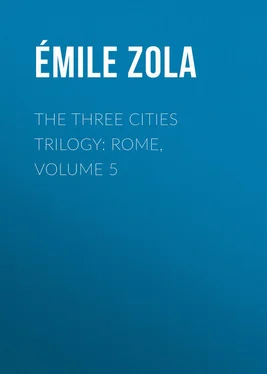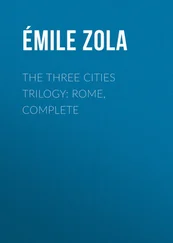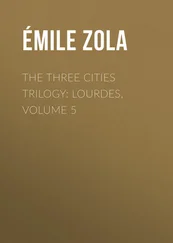Émile Zola - The Three Cities Trilogy - Rome, Volume 5
Здесь есть возможность читать онлайн «Émile Zola - The Three Cities Trilogy - Rome, Volume 5» — ознакомительный отрывок электронной книги совершенно бесплатно, а после прочтения отрывка купить полную версию. В некоторых случаях можно слушать аудио, скачать через торрент в формате fb2 и присутствует краткое содержание. Жанр: literature_19, foreign_antique, foreign_prose, на английском языке. Описание произведения, (предисловие) а так же отзывы посетителей доступны на портале библиотеки ЛибКат.
- Название:The Three Cities Trilogy: Rome, Volume 5
- Автор:
- Жанр:
- Год:неизвестен
- ISBN:нет данных
- Рейтинг книги:3 / 5. Голосов: 1
-
Избранное:Добавить в избранное
- Отзывы:
-
Ваша оценка:
- 60
- 1
- 2
- 3
- 4
- 5
The Three Cities Trilogy: Rome, Volume 5: краткое содержание, описание и аннотация
Предлагаем к чтению аннотацию, описание, краткое содержание или предисловие (зависит от того, что написал сам автор книги «The Three Cities Trilogy: Rome, Volume 5»). Если вы не нашли необходимую информацию о книге — напишите в комментариях, мы постараемся отыскать её.
The Three Cities Trilogy: Rome, Volume 5 — читать онлайн ознакомительный отрывок
Ниже представлен текст книги, разбитый по страницам. Система сохранения места последней прочитанной страницы, позволяет с удобством читать онлайн бесплатно книгу «The Three Cities Trilogy: Rome, Volume 5», без необходимости каждый раз заново искать на чём Вы остановились. Поставьте закладку, и сможете в любой момент перейти на страницу, на которой закончили чтение.
Интервал:
Закладка:
The man bowed as if to say that he was Signor Squadra, and then, with a fresh reverence, he invited the priest to follow him. Thereupon at a leisurely step, one behind the other, they began to thread the interminable suite of waiting-rooms. Pierre, who was acquainted with the ceremonial, of which he had often spoken with Narcisse, recognised the different apartments as he passed through them, recalling their names and purpose, and peopling them in imagination with the various officials of the papal retinue who have the right to occupy them. These according to their rank cannot go beyond certain doors, so that the persons who are to have audience of the Pope are passed on from the servants to the Noble Guards, from the Noble Guards to the honorary /Camerieri/, and from the latter to the /Camerieri segreti/, until they at last reach the presence of the Holy Father. At eight o'clock, however, the ante-rooms empty and become both deserted and dim, only a few lamps being left alight upon the pier tables standing here and there against the walls.
And first Pierre came to the ante-room of the /bussolanti/, mere ushers clad in red velvet broidered with the papal arms, who conduct visitors to the door of the ante-room of honour. At that late hour only one of them was left there, seated on a bench in such a dark corner that his purple tunic looked quite black. Then the Hall of the Gendarmes was crossed, where according to the regulations the secretaries of cardinals and other high personages await their masters' return; and this was now completely empty, void both of the handsome blue uniforms with white shoulder belts and the cassocks of fine black cloth which mingled in it during the brilliant reception hours. Empty also was the following room, a smaller one reserved to the Palatine Guards, who are recruited among the Roman middle class and wear black tunics with gold epaulets and shakoes surmounted by red plumes. Then Pierre and his guide turned into another series of apartments, and again was the first one empty. This was the Hall of the Arras, a superb waiting-room with lofty painted ceiling and admirable Gobelins tapestry designed by Audran and representing the miracles of Jesus. And empty also was the ante-chamber of the Noble Guards which followed, with its wooden stools, its pier table on the right-hand surmounted by a large crucifix standing between two lamps, and its large door opening at the far end into another but smaller room, a sort of alcove indeed, where there is an altar at which the Holy Father says mass by himself whilst those privileged to be present remain kneeling on the marble slabs of the outer apartment which is resplendent with the dazzling uniforms of the Guards. And empty likewise was the ensuing ante-room of honour, otherwise the grand throne-room, where the Pope receives two or three hundred people at a time in public audience. The throne, an arm-chair of elaborate pattern, gilded, and upholstered with red velvet, stands under a velvet canopy of the same hue, in front of the windows. Beside it is the cushion on which the Pope rests his foot in order that it may be kissed. Then facing one another, right and left of the room, there are two pier tables, on one of which is a clock and on the other a crucifix between lofty candelabra with feet of gilded wood. The wall hangings, of red silk damask with a Louis XIV palm pattern, are topped by a pompous frieze, framing a ceiling decorated with allegorical figures and attributes, and it is only just in front of the throne that a Smyrna carpet covers the magnificent marble pavement. On the days of private audience, when the Pope remains in the little throne-room or at times in his bed-chamber, the grand throne-room becomes simply the ante-room of honour, where high dignitaries of the Church, ambassadors, and great civilian personages, wait their turns. Two /Camerieri/, one in violet coat, the other of the Cape and the Sword, here do duty, receiving from the /bussolanti/ the persons who are to be honoured with audiences and conducting them to the door of the next room, the secret or private ante-chamber, where they hand them over to the /Camerieri segreti/.
Signor Squadra who, walking on with slow and silent steps, had not yet once turned round, paused for a moment on reaching the door of the /anticamera segreta/ so as to give Pierre time to breathe and recover himself somewhat before crossing the threshold of the sanctuary. The /Camerieri segreti/ alone had the right to occupy that last ante-chamber, and none but the cardinals might wait there till the Pope should condescend to receive them. And so when Signor Squadra made up his mind to admit Pierre, the latter could not restrain a slight nervous shiver as if he were passing into some redoubtable mysterious sphere beyond the limits of the lower world. In the daytime a Noble Guard stood on sentry duty before the door, but the latter was now free of access, and the room within proved as empty as all the others. It was rather narrow, almost like a passage, with two windows overlooking the new district of the castle fields and a third one facing the Piazza of St. Peter's. Near the last was a door conducting to the little throne-room, and between this door and the window stood a small table at which a secretary, now absent, usually sat. And here again, as in all the other rooms, one found a gilded pier table surmounted by a crucifix flanked by a pair of lamps. In a corner too there was a large clock, loudly ticking in its ebony case incrusted with brass-work. Still there was nothing to awaken curiosity under the panelled and gilded ceiling unless it were the wall-hangings of red damask, on which yellow scutcheons displaying the Keys and the Tiara alternated with armorial lions, each with a paw resting on a globe.
Signor Squadra, however, now noticed that Pierre still carried his hat in his hand, whereas according to etiquette he should have left it in the hall of the /bussolanti/, only cardinals being privileged to carry their hats with them into the Pope's presence. Accordingly he discreetly took the young priest's from him, and deposited it on the pier table to indicate that it must at least remain there. Then, without a word, by a simple bow he gave Pierre to understand that he was about to announce him to his Holiness, and that he must be good enough to wait for a few minutes in that room.
On being left to himself Pierre drew a long breath. He was stifling; his heart was beating as though it would burst. Nevertheless his mind remained clear, and in spite of the semi-obscurity he had been able to form some idea of the famous and magnificent apartments of the Pope, a suite of splendid /salons/ with tapestried or silken walls, gilded or painted friezes, and frescoed ceilings. By way of furniture, however, there were only pier table, stools, 1 1 M. Zola seems to have fallen into error here. Many of the seats, which are of peculiar antique design, do, in the lower part, resemble stools, but they have backs, whereas a stool proper has none. Briefly, these seats, which are entirely of wood, are not unlike certain old-fashioned hall chairs. – Trans.
and thrones. And the lamps and the clocks, and the crucifixes, even the thrones, were all presents brought from the four quarters of the world in the great fervent days of jubilee. There was no sign of comfort, everything was pompous, stiff, cold, and inconvenient. All olden Italy was there, with its perpetual display and lack of intimate, cosy life. It had been necessary to lay a few carpets over the superb marble slabs which froze one's feet; and some /caloriferes/ had even lately been installed, but it was not thought prudent to light them lest the variations of temperature should give the Pope a cold. However, that which more particularly struck Pierre now that he stood there waiting was the extraordinary silence which prevailed all around, silence so deep that it seemed as if all the dark quiescence of that huge, somniferous Vatican were concentrated in that one suite of lifeless, sumptuous rooms, which the motionless flamelets of the lamps as dimly illumined.
Интервал:
Закладка:
Похожие книги на «The Three Cities Trilogy: Rome, Volume 5»
Представляем Вашему вниманию похожие книги на «The Three Cities Trilogy: Rome, Volume 5» списком для выбора. Мы отобрали схожую по названию и смыслу литературу в надежде предоставить читателям больше вариантов отыскать новые, интересные, ещё непрочитанные произведения.
Обсуждение, отзывы о книге «The Three Cities Trilogy: Rome, Volume 5» и просто собственные мнения читателей. Оставьте ваши комментарии, напишите, что Вы думаете о произведении, его смысле или главных героях. Укажите что конкретно понравилось, а что нет, и почему Вы так считаете.












